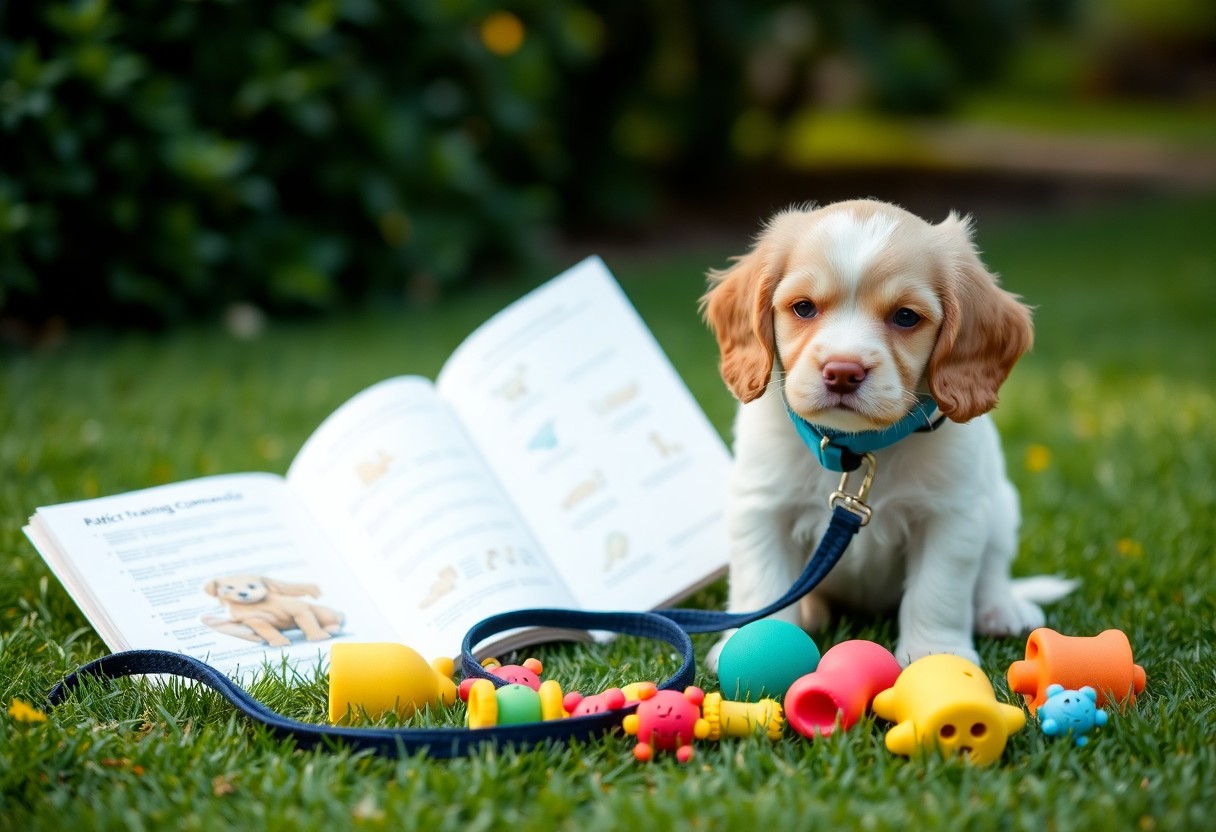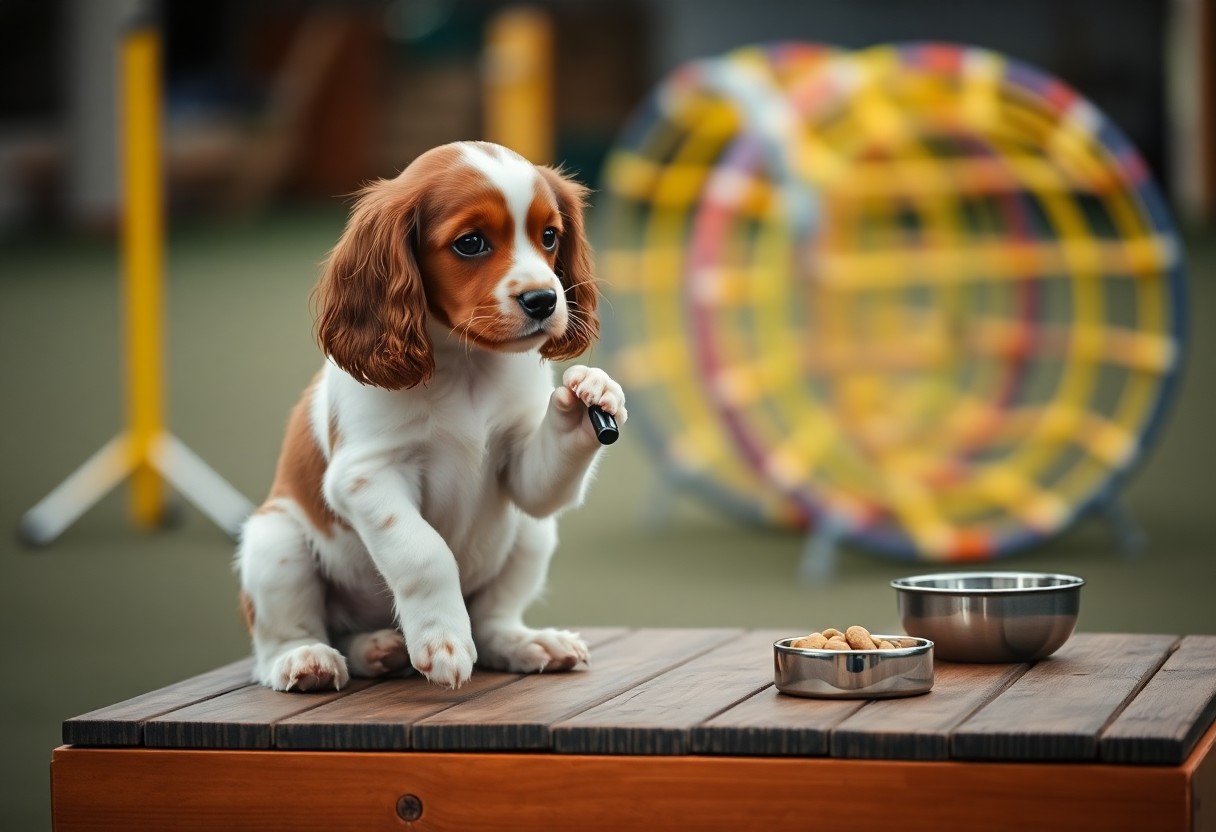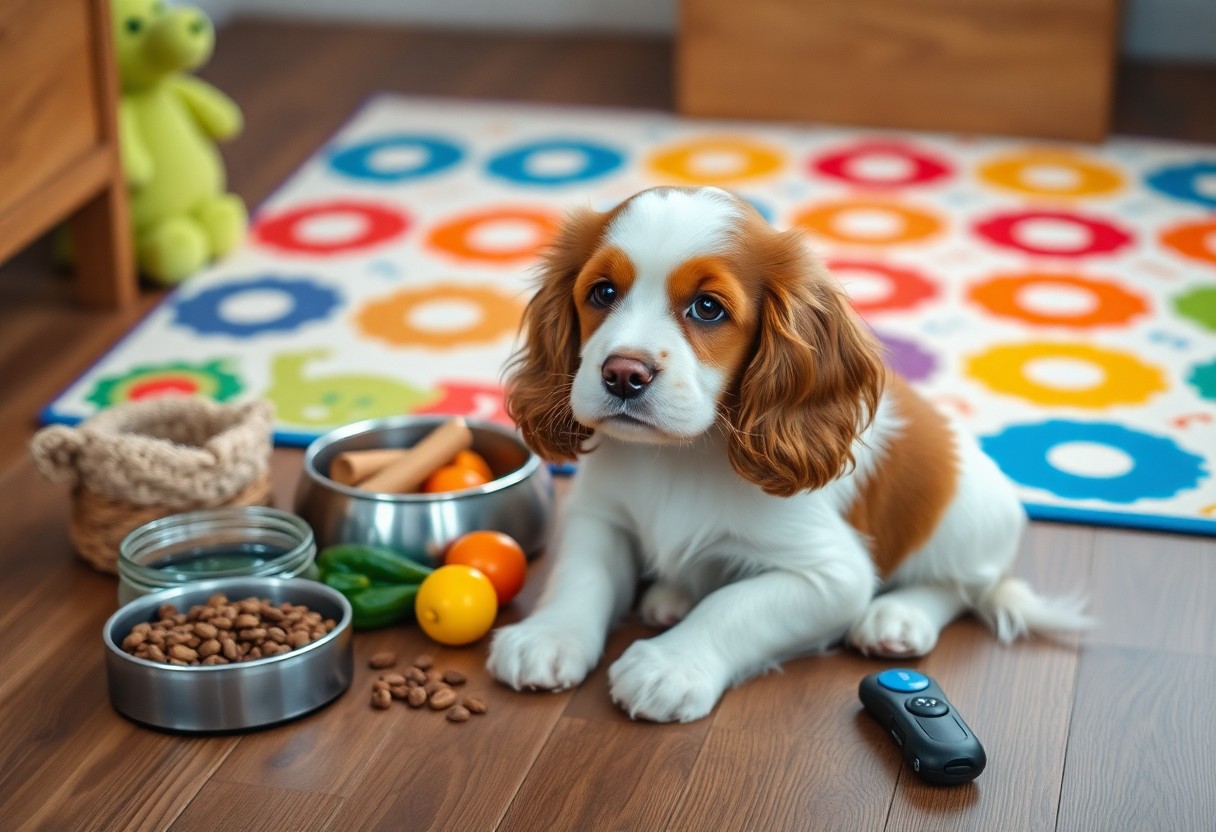Puppy training is a vital part of raising a well-behaved Cocker Spaniel. As a new owner, you’ll want to establish consistent routines and use positive reinforcement techniques to promote good behavior. Early socialization will help your puppy develop confidence and reduce potential issues later on. Be mindful of potential behavioral problems that can arise from lack of training, such as excessive barking or chewing. By committing time and effort now, you’ll enjoy a loving companion that thrives in your home.
Key Takeaways:
- Begin training early to establish good habits.
- Use positive reinforcement methods to encourage desired behaviors.
- Keep training sessions short and engaging to maintain your puppy’s attention.
- Socialize your Cocker Spaniel with other dogs and people for balanced behavior.
- Be consistent with commands and routines to reinforce learning.
- Introduce basic commands like sit, stay, and come during training.
- Be patient and understanding; every puppy learns at their own pace.
Understanding Cocker Spaniels
Breed Characteristics
Cocker Spaniels are medium-sized dogs, typically weighing between 20 to 30 pounds and standing around 14 to 15 inches tall at the shoulder. Their distinctive, long ears and expressive eyes give them a gentle appearance. This breed is known for its beautiful, silky coat, which requires regular grooming to prevent matting. Cocker Spaniels are often categorized into two varieties: the American and the English, with differences in appearance and temperament.
Temperament and Behavior
These dogs are known for their friendly and affectionate nature, making them an ideal family pet. Cocker Spaniels possess a strong desire to please, which contributes to their trainability. They are often sociable with other pets and enjoy being around people, but they may exhibit some stubbornness if not properly trained and socialized from a young age.
Their affectionate nature means that Cocker Spaniels thrive on human interaction and can become anxious or destructive if left alone for long periods. Regular mental stimulation and physical exercise are vital to keep them happy and well-behaved. Establishing a consistent routine helps your Cocker Spaniel understand what is expected of them, which further enhances their natural eagerness to learn. Engaging in activities like fetch or agility training can make training sessions enjoyable and rewarding for both you and your dog.
Essential Training Techniques
Incorporating effective training techniques ensures your Cocker Spaniel puppy not only learns commands but also develops a strong bond with you. Employing a mix of positive reinforcement, consistency, and patience is key to successful training. Techniques like clicker training can be particularly effective, helping your puppy associate sounds with rewards. Gradually introduce new skills, focusing on one command at a time, which allows for better retention and understanding.
Basic Commands
Teaching basic commands such as sit, stay, and come forms the foundation for your puppy’s learning. Start with one command at a time in a distraction-free environment. Use treats and praise to reinforce positive behavior, ensuring your Cocker Spaniel associates these commands with rewards. Practicing these commands daily will greatly improve your puppy’s responsiveness and foster good behavior.
Potty Training Tips
Potty training requires patience and vigilance since your Cocker Spaniel puppy needs to learn where it’s appropriate to go. Establish a consistent routine by taking your puppy outside frequently, especially after meals and naps. Use a designated spot in your yard, and reward your puppy immediately after they eliminate in the appropriate place. With time, they will begin to understand where they should go.
- Consistency is key—set a schedule for bathroom breaks.
- Use specific commands such as “go potty” to reinforce the action.
- Observe signs like sniffing or circling that mean they need to go.
- Accidents will happen—handle them with a calm demeanor to avoid stress. The
To effectively potty train your Cocker Spaniel, ensure that you provide ample opportunities for bathroom breaks, especially during the first few months. Keeping a close eye on your puppy inside the house can help catch them before they make a mistake. Crate training can also aid in this process, as dogs naturally avoid soiling their sleeping area. Be patient and consistent, as this phase typically takes several weeks, and expect occasional setbacks. The
- Use a crate to help them understand their space.
- Accidents should be cleaned thoroughly to remove scent.
- Celebrate successes with treats and affection to encourage good behavior.
- Establishing a routine will help them learn faster. The
Socialization Strategies
Successfully socializing your Cocker Spaniel puppy requires a proactive approach that enhances their interactions with various environments, people, and other animals. Exposure to different settings and experiences early on fosters confidence and adaptability, reducing the likelihood of behavioral issues later in life.
Importance of Early Socialization
Early socialization acts as a foundational building block for your puppy’s development. Engaging with diverse sights, sounds, and experiences during the critical first 16 weeks helps shape their temperament and reduces anxiety in new situations. Puppies that experience positive exposure are less likely to develop fear-based aggression or anxiety later on.
Introducing to Other Pets and People
Introducing your Cocker Spaniel puppy to other pets and people should be a gradual and controlled process. Start with calm, vaccinated pets and friendly individuals, allowing your puppy to explore at their own pace. Observing their body language will help you gauge their comfort level and adjust interactions accordingly.
Begin introductions in a neutral area, ensuring that both your puppy and the other animals feel safe and relaxed. Use treats and praise to encourage positive interactions. Gradually expose your puppy to larger groups of people and varied environments, including busy parks and social gatherings. This will help them learn appropriate behaviors and how to remain calm amidst excitement, reinforcing their confidence as they interact with the world.
Physical and Mental Exercise
Providing adequate physical and mental exercise for your Cocker Spaniel puppy plays a key role in their overall development and well-being. A balanced routine can help prevent behavioral issues stemming from boredom or excess energy. Aim for at least 30 to 60 minutes of exercise daily, combining playtime, walks, and structured activities to stimulate their senses and maintain their health.
Ideal Activities for Cocker Spaniels
Engaging in activities tailored to your Cocker Spaniel’s energy and playfulness is vital. Consider fetch, tug-of-war, and agility courses as excellent ways to bond while keeping them physically active. Daily walks not only provide exercise but also expose your puppy to new sights and smells, enriching their environment and socialization skills.
Interactive Toys and Games
Incorporating interactive toys and games can significantly enhance your Cocker Spaniel’s mental stimulation. Puzzle toys that dispense treats encourage problem-solving skills and provide hours of entertainment. Using toys that challenge their intellect helps foster independence and reduces anxiety while you are away.
Investing in a variety of interactive toys, such as treat-dispensing balls or puzzle feeders, can keep your Cocker Spaniel engaged and mentally sharp. These toys typically involve multiple steps, encouraging your puppy to strategize and think critically about how to access the rewards inside. Regular sessions with these types of toys can also prevent unwanted behaviors by channeling their energy into constructive play. Aim for two to three interactive sessions per week to strike a balance between physical activity and mental engagement.
Common Training Challenges
Training a Cocker Spaniel puppy comes with unique challenges. Distractions can hinder your puppy’s focus, making it imperative to tackle these issues early on. For Tips on raising a Cocker Spaniel puppy, ensure that your training sessions happen in a controlled environment to minimize outside stimuli. Stay patient and consistent, reinforcing positive behavior to build a strong training foundation.
Dealing with Distractions
Your Cocker Spaniel puppy may struggle with distractions from noises, people, and other animals. Start training in a quiet area to reduce these interruptions, gradually introducing distractions as your puppy shows improvement. Use high-value treats and praise to maintain focus, rewarding them when they ignore outside stimuli.
Addressing Separation Anxiety
Separation anxiety is a common issue for Cocker Spaniels, especially since they thrive on companionship. To help your puppy adjust, practice short departures and gradually increase the duration you’re away. Provide a safe space with toys and comforts, making your absence less daunting. Training sessions that promote independence, like “go to your bed,” can foster confidence.
Over time, consistent practice helps alleviate your puppy’s anxiety. Consider using puzzle toys or chewables to keep them occupied during your absences. Gradual desensitization techniques also work well; put your puppy in a separate room for brief moments while offering toys or treats. Building a routine helps your Cocker Spaniel know what to expect, reducing feelings of insecurity when you leave the house.
Health and Nutrition Considerations
Puppy Diet Essentials
Your Cocker Spaniel puppy thrives on a balanced diet rich in high-quality proteins, healthy fats, and important vitamins. Look for puppy-specific foods with meat as the primary ingredient, avoiding fillers like corn and soy. Puppies require a higher caloric intake, so feed them three to four meals a day to support their rapid growth. Drinking fresh, clean water should always be accessible to keep them hydrated.
Regular Veterinary Check-ups
Scheduling routine veterinary visits plays a vital role in your puppy’s health and longevity. These trips allow for vaccinations, nutritional advice, and early detection of potential issues. Vaccines like parvovirus and distemper should be administered according to your vet’s timeline to ensure comprehensive protection. Regular examinations can help your vet monitor growth and development, adjusting feeding plans and identifying any health concerns early on. Consider setting up a vaccination schedule to stay organized and proactive about your puppy’s health.
Final Words
So, as you launch on this journey of training your Cocker Spaniel puppy, focus on consistency, patience, and positive reinforcement. Establish a routine that incorporates fun and engaging activities, ensuring your puppy is well-socialized and mentally stimulated. Prioritize early training to build a strong foundation for good behavior, and cherish each moment spent bonding with your new companion. By following these important tips, you will cultivate a well-mannered, happy Cocker Spaniel, enhancing your life together.
FAQ
Q: What is the best age to start training my Cocker Spaniel puppy?
A: Start training your Cocker Spaniel puppy as early as 8 weeks old. Early socialization and basic commands are key during this developmental stage.
Q: How long should training sessions last?
A: Keep training sessions short, around 5 to 10 minutes. Puppies have short attention spans, so frequent, brief sessions are more effective than longer ones.
Q: What are the crucial commands to teach my Cocker Spaniel puppy?
A: Start with basic commands like sit, stay, come, and down. These foundational commands help establish good behavior and communication.
Q: How can I effectively socialize my Cocker Spaniel puppy?
A: Introduce your puppy to various environments, people, and other animals. Positive experiences during socialization help reduce anxiety and foster confidence.
Q: What methods are best for training my puppy?
A: Use positive reinforcement methods, such as treats, praise, and playtime. These motivate your puppy and create a positive association with learning.
Q: How do I address unwanted behaviors in my Cocker Spaniel puppy?
A: Redirect unwanted behaviors using positive reinforcement to encourage desired actions. Consistency is key, and avoid punishment as it can lead to fear and anxiety.
Q: When should I start leash training my Cocker Spaniel puppy?
A: Begin leash training as soon as you bring your puppy home. Use a lightweight leash and harness to make the experience comfortable and enjoyable.


